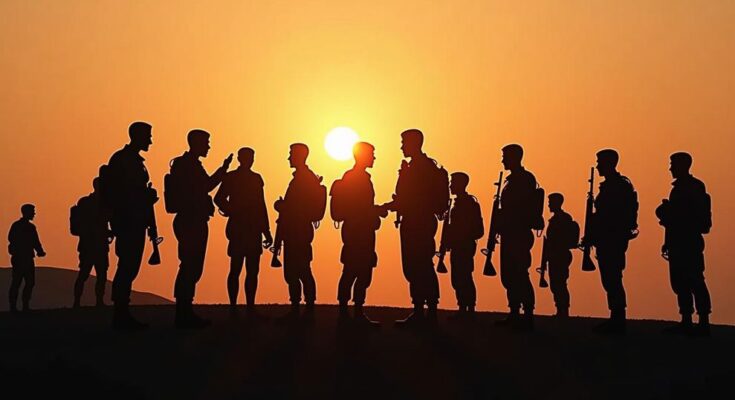As Tunisia nears a presidential election, concerns regarding the military’s increasing political involvement under President Kais Saied intensify. Historically marginalized, the army has gained prominence since the 2011 revolution, especially following Saied’s consolidation of power in 2021. This shift raises alarms over the potential erosion of democracy as military leaders are appointed to significant government positions, reflecting a significant change in the political landscape of Tunisia.
The role of the Tunisian army in politics is increasingly drawing scrutiny as the country approaches the upcoming presidential election. Historically, the military was marginalized under the regimes of Presidents Habib Bourguiba and Zine el-Abidine Ben Ali. However, following the 2011 revolution, the army gained a reputation as the “guarantor of democracy.” Since President Kais Saied’s election in 2019, the military’s political involvement has expanded significantly, particularly after Saied’s consolidation of power in July 2021. Under Saied, the army has been integrated more deeply into political affairs, including unprecedented appointments of high-ranking military officials to ministerial positions. This change raises concerns among political observers about the potential implications for democracy in Tunisia. Unlike other North African nations such as Algeria and Egypt, the Tunisian military has historically refrained from an economic-political role, largely due to Bourguiba’s insistence on keeping the military separate from governance after the country’s independence. After the revolution, public perception of the army shifted positively, bolstered by its role in maintaining order and supporting the electoral process. The military’s involvement grew further during the fight against terrorism in the country, leading to increased military budgets and Western support, primarily from the United States. President Saied has relied heavily on military support to bolster his authority, evident in his declaration of leadership over all military and civilian forces. As tensions rise ahead of the October election, questions persist regarding the military’s commitment to democratic principles versus authoritarianism, particularly given recent reports of dissatisfaction within the ranks concerning political repression of dissenting voices.
The Tunisian army has historically occupied a complex space within the country’s politics. Following independence in 1956, the military was largely sidelined, particularly under the leadership of President Bourguiba, who preferred to military to remain apolitical. This stance was bolstered after Bourguiba escaped an attempted coup. In contrast, the Ben Ali era was characterized by a perception of the military as a threat, culminating in the Barraket Essahel case, which saw numerous military personnel accused of conspiracy. The 2011 revolution transformed perceptions of the military, elevating its status as a defender of democracy. The subsequent years saw the army taking on a more active role in civil society, including involvement in the electoral process, where it was seen as a dependable guardian of fair elections. However, recent developments under President Saied have resulted in a significant shift, wherein the military has gained more political power, raising alarms about the future of democracy in Tunisia.
In summary, the evolving role of the Tunisian army in political matters poses significant challenges to the democratic framework established post-revolution. The emphasis placed by President Saied on military support to fortify his regime complicates the relationship between civilian governance and military power. As Tunisia approaches its presidential elections, the critical question remains whether the army will uphold its newfound political authority in alignment with democratic principles or succumb to authoritarian pressures.
Original Source: www.middleeasteye.net




